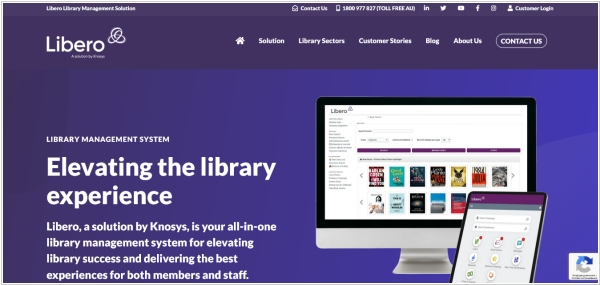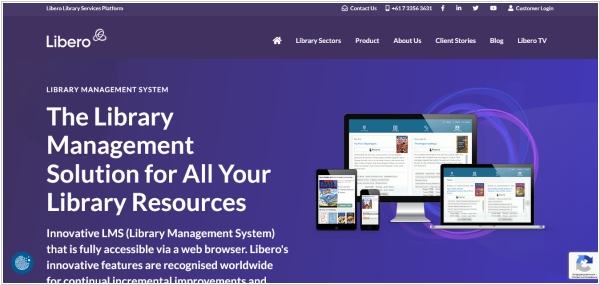LIBERO alternatives
Fully mobile, cloud-based, web browser-accessible & works with Windows 10. Discovery & consortia solutions also available. LIBERO is the perfect solution to your eResource, learning, and discovery requirements. Customisation options, ongoing product development and LIBERO WebServices ensure the library continues to effectively support the curriculum and the long-term strategy of your institution.
Here are the latest news about LIBERO:
26.03.24. Libero Library Management System adds 2-Factor Authentication

Knosys has unveiled the latest iteration of Libero, version 6, which emphasizes enhancing system functionalities, user interface experiences, and overall workflow efficiency. Key highlights of this release encompass the introduction of Two-Factor Authentication (2FA) to bolster security and access control for the Libero 6 Dashboard login, providing users with the option to employ an additional layer of security through Email, SMS, or Time-based One-Time Passwords (TOTP). Additionally, there are notable enhancements in bibliographic data management, including improved capabilities for merging data within existing records and expanded MAB to MARC conversion tasks. Moreover, member experiences in the WebOPAC have been refined to enable more precise searching and feature-rich registration forms, while navigation within the Member Portal is now more seamless with enhanced sorting and visual upgrades.
2022. Libero to offer libraries more security

Libero has introduced several enhancements to its cloud-based library management system. These include options for default passwords and improved security measures for library members, courtesy reminder emails that provide comprehensive renewal details in one place, and the ability to store and utilize preferred names for members while maintaining consistency in official correspondence. Libraries now have the flexibility to simplify the initial access of members to online services by setting the surname or telephone numbers as the default password. Additionally, libraries can enforce password changes after the first login to the WebOPAC, ensuring enhanced security. These updates aim to enhance user experience, ensure data security, and promote inclusivity within library services.
26.03.24. Libero Library Management System adds 2-Factor Authentication

Knosys has unveiled the latest iteration of Libero, version 6, which emphasizes enhancing system functionalities, user interface experiences, and overall workflow efficiency. Key highlights of this release encompass the introduction of Two-Factor Authentication (2FA) to bolster security and access control for the Libero 6 Dashboard login, providing users with the option to employ an additional layer of security through Email, SMS, or Time-based One-Time Passwords (TOTP). Additionally, there are notable enhancements in bibliographic data management, including improved capabilities for merging data within existing records and expanded MAB to MARC conversion tasks. Moreover, member experiences in the WebOPAC have been refined to enable more precise searching and feature-rich registration forms, while navigation within the Member Portal is now more seamless with enhanced sorting and visual upgrades.
2022. Libero to offer libraries more security

Libero has introduced several enhancements to its cloud-based library management system. These include options for default passwords and improved security measures for library members, courtesy reminder emails that provide comprehensive renewal details in one place, and the ability to store and utilize preferred names for members while maintaining consistency in official correspondence. Libraries now have the flexibility to simplify the initial access of members to online services by setting the surname or telephone numbers as the default password. Additionally, libraries can enforce password changes after the first login to the WebOPAC, ensuring enhanced security. These updates aim to enhance user experience, ensure data security, and promote inclusivity within library services.
Add comment

